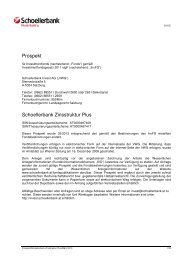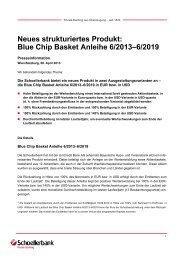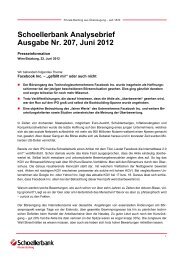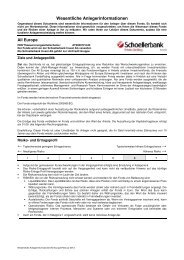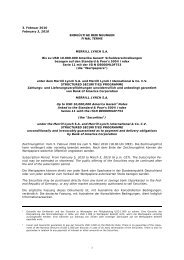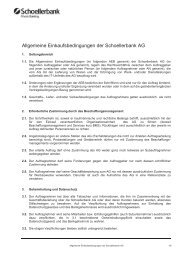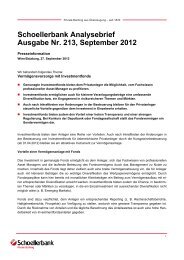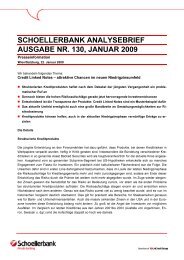Barclays, Base Prospectus 2006
Barclays, Base Prospectus 2006
Barclays, Base Prospectus 2006
You also want an ePaper? Increase the reach of your titles
YUMPU automatically turns print PDFs into web optimized ePapers that Google loves.
- 170 -<br />
Residents" applies. Capital gains from the disposition of Notes other than proceeds from their sale or<br />
redemption recharacterised as interest income for German tax purposes (as explained above under “Tax<br />
Residents”) are, however, only taxable in the case of (i) above.<br />
Non-residents of Germany are, in general, exempt from German withholding tax on interest and the<br />
solidarity surcharge thereon. However, where the interest is subject to German taxation as set forth in<br />
the preceding paragraph and Notes are held in a custodial account with a Disbursing Agent,<br />
withholding tax is levied as explained above under “Tax Residents”. Where Notes are not kept in a<br />
custodial account with a Disbursing Agent and interest or proceeds from the disposition or redemption<br />
of a Note are paid by a Disbursing Agent to a non-resident, withholding tax of 35 per cent. will apply<br />
as explained above under “Tax Residents”. The withholding tax may be refunded based upon an<br />
applicable tax treaty.<br />
Special rules for Notes linked to the performance of an underlying<br />
Tax Residents<br />
Interest/ Capital gains<br />
Persons who are tax residents of Germany (i.e., persons whose residence, habitual abode, statutory seat,<br />
or place of effective management and control is located in Germany) are taxed differently depending<br />
on whether the Notes are held as a private asset (Privatvermögen) or as a business assets<br />
(Betriebsvermögen).<br />
(a) Taxation if the Notes are held as a private asset (Privatvermögen)<br />
(i) Income from capital investments (Einkünfte aus Kapitalvermögen)<br />
According to Section 20 para 1 no. 7 of the German Income Tax Act (Einkommensteuergesetz) income<br />
from capital investment (Einkünfte aus Kapitalvermögen) is subject to income tax, if according to the<br />
terms of the respective financial instrument a repayment of the investment of the investor is promised<br />
or granted or interest payments are promised or granted, even in case the amount of the interest owed to<br />
the investor depends upon an uncertain event.<br />
According to a circular of the Federal Ministry of Finance dated 27 November 2001 (BMF IV C 3 -S<br />
2256 – 265/01) an investor investing in an index certificate, where the index consists of shares, is not<br />
subject to tax with his income derived from such an investment due to an increase of the underlying<br />
index, if any payments to the investor with regard to the investment depend entirely upon the<br />
(uncertain) movement of the underlying index. On the basis of the circular issued by the Federal<br />
Ministry of Finance several Regional Finance Offices (e.g. Frankfurt, decree dated 23 October 2003 -<br />
S-2252 A - 42 - St I1 3.04) have stated that index certificates, which are linked to a stock index, should<br />
not fall under the scope of Section 20 para 1 no. 7 German Income Tax Act.<br />
However, according to the German tax administration such financial instruments generate taxable<br />
interest income, if without an explicit or implicit agreement the repayment of the invested capital or the<br />
payment of a consideration is ensured due to the economic terms of the financial instrument.<br />
The German tax administration emphasizes that a taxation in accordance with Section 20 para 1 no. 7<br />
German Income Tax Act does not require that the invested capital will be repaid in total, but that<br />
Section 20 para 1 no. 7 German Income Tax Act is also applicable if only a partial repayment of the<br />
invested capital is promised. With regard to the repayment amount, a specific limit amount cannot be<br />
numeralised. In fact, any guaranteed repayment is sufficient. Furthermore, concerning the income tax<br />
treatment neither the labeling nor the legal form of the financial instrument is decisive, but the<br />
economic substance of the agreement of the respective financial product.<br />
Therefore, depending upon the respective type of Note it can not be excluded that the German tax<br />
administration applies Section 20 para 1 no. 7 EStG to the Notes with the reasoning that economically a<br />
partial redemption of the issue price is certain under the Notes. The German tax administration might<br />
argue that the Notes are economically designed such that a certain repayment of at least a part of the<br />
invested capital is guaranteed. In this case, payments under the Notes (taxable notes) would be subject



